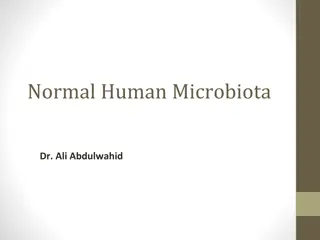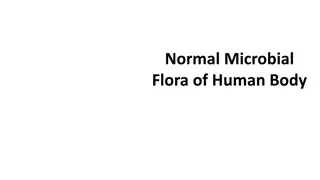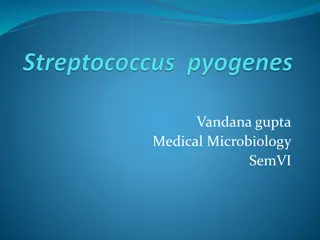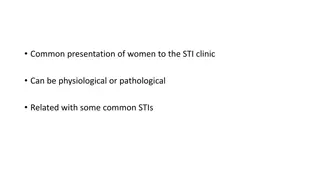Understanding Normal Human Microbiota and Its Role in Health
Normal Human Microbiota, consisting of microbes on the skin and mucous membranes, play a crucial role in human health by providing defense against pathogens, aiding in digestion, and contributing to immune system maturation. The microbiota can be resident or transient, with colonization starting at
0 views • 27 slides
Klebsiella Species: Characteristics and Pathogenicity
Klebsiella species, such as K. pneumoniae and K. oxytoca, are gram-negative bacilli commonly found in the microbiota of the intestines, nasopharynx, and feces. They exhibit distinct characteristics like pink mucoid colonies on MacConkey's agar and are known to cause both community-acquired and hospi
0 views • 24 slides
Understanding Normal Human Microbiota and Its Role in Health
Normal human microbiota refers to the microorganisms residing on our skin and mucous membranes, playing vital roles in digestion, immunity, and protection against pathogens. They are categorized into resident and transient groups, with resident flora aiding in maintaining health by synthesizing nutr
0 views • 28 slides
Understanding the Normal Microbial Flora of the Human Body
The normal microbial flora, also known as the indigenous microbiota, inhabit various areas of the human body such as the gastrointestinal tract, respiratory tract, genitourinary tract, and skin. They play a crucial role in maintaining health and can re-establish themselves when disturbed. While resi
0 views • 22 slides
Understanding Functional GI Disorders: A Comprehensive Overview
Functional GI disorders encompass a range of conditions affecting the gastrointestinal system, such as irritable bowel syndrome and disorders of the gut-brain interaction. These disorders are characterized by no structural abnormalities but are influenced by factors like motility disturbance, viscer
0 views • 42 slides
Dimensions of Biodiversity - Exploring Earth's Diverse Ecosystems
The Dimensions of Biodiversity initiative, starting with a 10-year campaign, aims to characterize the genetic, functional, and ecological diversity on Earth through innovative research approaches. Funded projects include studies on tree communities, gut microbiota of bees, vulnerability of biodivers
0 views • 10 slides
Overview of Streptococci and Their Classification in Medical Microbiology
Streptococci are diverse Gram-positive bacteria found in nature, some of which are part of the human microbiota while others cause diseases. This article discusses the morphology, classification, hemolysis properties, Lancefield grouping, and details about Streptococcus pyogenes, a significant human
0 views • 21 slides
Understanding Common Women's Health Issues Related to STIs
Women's presentations at STI clinics can be either physiological or pathological, often associated with common STIs. The physiology of the vulvovaginal area serves as the first line of defense against infections, and the maintenance of a healthy microbiota plays a crucial role in vulvovaginal health
0 views • 99 slides
Effects of Maternal Wheat Bran Supplementation on Piglet Microbiota
This study investigates the impact of maternal wheat bran supplementation on the microbiota and intestinal parameters of piglets, aiming to address gut disorders and the overuse of antibiotics in swine production. The research focuses on the potential benefits of prebiotics like wheat bran in improv
0 views • 16 slides








